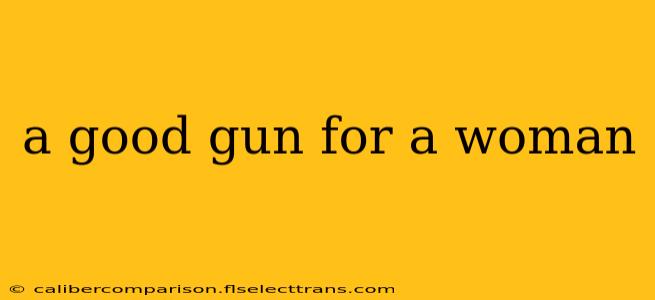Finding the Right Firearm: A Guide for Women
Choosing a firearm is a deeply personal decision, and what's "good" depends entirely on individual needs, preferences, and experience levels. This guide aims to empower women by providing information and considerations to help them find the best firearm for their specific circumstances. We'll avoid focusing on aesthetics or marketing hype and instead concentrate on practical factors crucial for safety and effective self-defense.
Understanding Your Needs:
Before diving into specific models, let's define your priorities. Honest self-assessment is key:
- Experience Level: Are you a complete beginner, or do you have prior shooting experience? This dramatically influences the type of firearm and training you'll need.
- Intended Use: Primarily self-defense at home? Concealed carry? Hunting? Target practice? The purpose dictates firearm features and caliber.
- Physical Attributes: Strength, hand size, and overall physical capabilities impact how comfortably you can handle different firearms. A smaller, lighter handgun might be preferable for someone with less upper body strength.
- Lifestyle: Do you have a physically demanding job? A heavy firearm might be cumbersome. Consider how easily you can carry and maintain your chosen weapon.
Types of Firearms to Consider:
-
Handguns: Popular for self-defense due to concealability and ease of handling.
- Revolvers: Simple, reliable, and generally easy to learn. However, they typically hold fewer rounds than semi-automatic pistols.
- Semi-automatic Pistols: Offer higher capacity magazines, but require more familiarity with operation and maintenance. Many models are available in various sizes and calibers to suit different needs and preferences.
-
Shotguns: Excellent home-defense options due to their stopping power and relatively easy operation (pump-action or semi-automatic). However, they are larger and less concealable than handguns.
-
Rifles: While less common for concealed carry, rifles can offer significant stopping power and accuracy at longer ranges. They are best suited for home defense or situations where longer-range capabilities are necessary.
Caliber Considerations:
Caliber refers to the diameter of the bullet. Common self-defense calibers include:
- 9mm: A popular and effective round, offering a balance between stopping power, recoil, and magazine capacity.
- .380 ACP: A smaller, lower-recoil cartridge, suitable for smaller-framed individuals or those new to firearms.
- .45 ACP: A larger, more powerful round with significant stopping power, but with more recoil.
- .22 Long Rifle: Used in both rifles and handguns, it offers less recoil but requires more precise shot placement for effective self-defense.
Choosing the Right Firearm:
The best approach is to visit a reputable firearms dealer. Discuss your needs with knowledgeable staff, and handle different models to find what feels comfortable and manageable. Never purchase a firearm without proper training.
Training is Paramount:
No matter the firearm you choose, professional training is absolutely essential. This includes safe handling, proper shooting techniques, and legal aspects of firearm ownership. Several organizations offer courses specifically designed for women.
Beyond the Firearm:
Remember that a firearm is just one component of personal safety. Consider other safety measures, such as home security systems, self-defense classes, and situational awareness training.
Disclaimer: This information is for educational purposes only and should not be considered professional advice. Always consult with qualified instructors and legal professionals before purchasing or handling firearms. Firearm laws vary significantly by location; ensure you comply with all applicable regulations.

